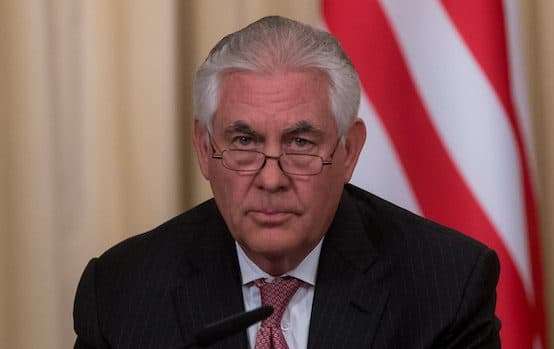
Donald Trump’s firing of Secretary of State Rex Tillerson on Tuesday was welcomed in many quarters of official Washington as a kind of deliverance—or evidence, perhaps, of justice served. The crowing could be heard all the way to the pages of the The Atlantic, whose contributors have made Tillerson a kind of Foggy Bottom piñata. It would be hard, for instance, to find a more damning criticism of “T-Rex” than the one leveled against him by author Eliot Cohen, expert on everything military and drum major for the interventionist set.
Cohen’s December 1 takedown of Tillerson (“The Worst Secretary of State in Living Memory”) initially served as a kind of rallying cry for the Washington policymaking establishment. Tillerson’s failures, Cohen wrote, included “an introverted and cocooned style of management,” “insufficient skill at buttering up his volatile boss,” “morbid suspicion and sequestration of the State Department press,” “management-jargon-laden reforms heavy on business-speak,” “low familiarity with the work of diplomacy” and an “incapacity at finding and pushing through appointees who might do the work of diplomacy.” It’s a breathtaking read.
Cohen’s December solution to the Tillerson “disaster”—as he termed it—was the appointment of CIA Director Mike Pompeo, rumored even then (this was all of four months ago) to be T-Rex’s likely successor and Trump’s best buddy in the cabinet. “Even implacable enemies of the administration,” Cohen wrote, “should cheer the arrival of Mike Pompeo as secretary of state. He is a former Army officer, a successful politician, and a veteran of running a large bureaucracy—the CIA. This means that, unlike Tillerson, he is used to motivating career people he cannot either fire or incentivize with money.”
While Cohen wasn’t the only one who offered a withering critique of Tillerson, he was often seen as walking point for Washington’s high-profile neoconservative establishment, a gaggle of policy intellectuals and recognized commentators who include right-wing Washington Post blogger Jennifer Rubin (now a regular anti-Trumpian on MSNBC), Pompeo cheerleader Bill Kristol (the founder of the neocon mouthpiece the Weekly Standard), columnist Max Boot (who once described Tillerson as “an amoral businessman”), Rumsfeld pal and defense heavyweight Eric Edelman, neocon analyst and author Robert Kagan (who told New Yorker writer Robin Wright that Tillerson was “an unmitigated disaster”), and Danielle Pletka (the influential head of the American Enterprise Institute)—among innumerable others.
Of course, the problem for this clique of in-the-know wonks was not only that their opposition to Tillerson was undergirded by their doubts about Trump (some of them, like Boot, actually admitted to voting for Clinton), but that their calls for the head of T-Rex put them in league with the fire-breathing reactionaries of the primitive right. That gaggle includes Frank Gaffney, the shrill anti-Muslim head of the Center for Security Policy; John Bolton, who wants to rip up the Iran deal (and who’s been slipping in and out of the White House looking for a job); Steve Bannon, who admitted to the New Yorker that he had blocked some of Tillerson’s appointments while serving with Trump; and Bannon buddy Sebastian Gorka, who sniped at Tillerson in public. For them, Rex Tillerson’s chief sin wasn’t that he had a “low familiarity with the work of diplomacy,” but that he believed in it at all.
That’s a strangely cobbled-together crew (Eliot Cohen would undoubtedly recoil from the suggestion that he’s allied with a reputed Hungarian fascist), but even those two groupings shrink in influence in comparison to a third, run out of a suite of well-appointed offices on M Street in Washington. Founded by neoconservative journalist Clifford May just after 9/11, the non-profit Foundation for Defense of Democracies (FDD) has emerged as perhaps the most powerful outside influencer of the Trump White House today.
FDD is notorious: a self-styled “non-partisan policy institute,” the non-profit organization is funded primarily by right-wing supporters of Israel, including billionaire Sheldon Adelson, a close ally of Israeli Prime Minister Benjamin Netanyahu. Over the nearly two decades since its founding, FDD has promoted the Iraq War, banged the drum for an attack on Syria, opposed the Obama administration’s nuclear negotiations with Iran, extolled the virtues of Benjamin Netanyahu, and, at the beginning of this decade, launched a crusade that targeted the tiny Persian Gulf country of Qatar where the U.S. maintains an airbase.
FDD’s anti-Qatar crusade was led by the its vice president for research, Jonathan Schanzer, a former terrorism finance analyst at the Treasury Department who, over the course of the last eight years, has authored dozens of articles (in Foreign Policy, Politico, The Atlantic, the New York Times, and the New York Post, among many others) slamming Qatar for being too close to Iran, having links with the Taliban, supporting humanitarian programs in Hamas-controlled Gaza, backing the Muslim Brotherhood political movement, and supporting jihadists in the Syrian civil war. But the focus of the FDD efforts, and Schanzer’s obsession, was Qatar’s hosting of the leaders of Hamas.
For a time, the FDD’s anti-Qatar inquisition had little impact, with senior Pentagon officials dismissing the campaign as “just noise.” But then, in June of last year, the United Arab Emirates, Saudi Arabia, Bahrain, and Egypt launched an economic embargo against Qatar, isolating the country from outside contact and splitting apart the Gulf Cooperation Council. The UAE and FDD shared the common goal of stigmatizing Qatar for its ties to Hamas and, more crucially at least for the UAE-led coalition, its economic and diplomatic ties to Iran. FDD, as it turned out, took on an outsized role in the UAE-led anti-Qatar coalition, as a tranche of leaked emails from FDD’s Mark Dubowitz and senior counselor John Hannah to Yousef al-Otaiba, the UAE’s ambassador to Washington, made clear.
Among other topics, the June 2017 emails suggested a three-day meeting between FDD officials (Dubowitz, Hannah, and Schanzer) and UAE Middle East “experts” aimed at “reducing source of Qatari leverage, especially dependence on Al Udeid [airbase]”—a strangely partisan agenda for an organization that claims to be a “non-partisan policy institute.” The emails, the result of a hack by the anonymous group GlobalLeaks, also included a request that the UAE arrange a meeting between FDD officials and Mohammad Dahlan, the exiled and controversial Palestinian leader. (Dahlan, as the American public later learned, was also an attendee at the notorious Seychelles meeting now being investigated by Special Counsel Robert Mueller.)
Not surprisingly, Rex Tillerson was immediately enmeshed in the UAE-led Qatar embargo, and, with the support of Secretary of Defense James Mattis, attempted to dampen its impact. Tillerson, it turns out, was not only blindsided by the embargo, but, as was reported in these pages last June, suspected that Trump’s son-in-law Jared Kushner had known of the UAE’s plans, failed to notify him, and instead urged the president to endorse the UAE initiative, which Trump did. Tillerson was not only shocked, he was angry. “Rex put two-and-two together,” a close associate of Tillerson told TAC at the time, “and concluded that this absolutely vacuous kid [Kushner] was running a second foreign policy out of the White House family quarters. [UAE ambassador to the U.S.] Otaiba weighed in with Jared and Jared weighed in with Trump. What a mess.”
Beginning in June of 2017, Tillerson worked to dampen and, as he hoped, end the embargo. The effort included multiple trips to the region, meetings with Gulf leaders, and the strong-arming of Qatari officials to meet at least some of the demands of the UAE-led anti-Qatar coalition. “Rex was tireless, absolutely tireless,” a senior Pentagon official who tracked Tillerson’s efforts told TAC. “All of this talk about how Tillerson was an ineffective diplomat just isn’t true. This was shuttle diplomacy at its best.” Tillerson’s efforts, which included enlisting the help of Kuwaiti and British diplomats, resulted in a July Memorandum of Understanding between the U.S. and Qatar aimed at stopping terrorist financing.
Tillerson’s efforts, while prodigious, failed to heal the rift between Qatar and its neighbors, but it clearly backfooted the anti-Qatar coalition, who’d hoped to pressure their neighbor into ending its relations with Iran, isolate Turkey (a strong Qatar supporter), and shutter the Doha-based Al Jazeera television network. Tillerson’s efforts not only remained unacknowledged by the Trump White House, they only deepened the uneasy alliance of forces arrayed against him. Those forces, according to emails leaked in early March by the BBC, now included Erik Prince sidekick Elliott Broidy, a U.S. businessman and Trump campaign donor with deep business ties to the UAE’s Mohammed bin Zayed. According to the emails, Broidy met with Trump in October and told him that Tillerson was “performing poorly and should be fired at a political convenient time.” The emails described Tillerson as “weak” and “a tower of jello” who needs to be “slammed.”
It took Donald Trump another four months to “slam” Tillerson and replace him with CIA Director Mike Pompeo. While Tillerson’s demise can be dated to the moment it was reported that he called the president a “moron” back in October, the clock actually started ticking the previous June, when Tillerson decided he would work to reverse the UAE-led embargo against Qatar. Which is why, within hours of Trump’s announcement that Tillerson was being shown the door, his enemies in the Gulf States held a mini-celebration. Among the celebrants was Abdulkhalez Abdullaa, a prominent UAE political science professor, who insinuated that his country could take credit for Tillerson’s demise. “History will remember that a Gulf state had a role in expelling the foreign minister of a superpower and that’s just the tip of the iceberg,” he wrote on Twitter.
There was also, it appears, a celebration at the offices of the Foundation for the Defense of Democracies, whose officials now have clear sailing in their efforts not only to continue fstigmatizing Qatar, but to undermine—and end—the Obama administration’s nuclear agreement with Iran. Within hours of the Tillerson announcement, FDD President Mark Dubowitz tweeted his approval of the move. “BREAKING,” he tweeted. “Trump ousts Secretary of State Rex Tillerson, will replace him with CIA Director Mike Pompeo.” Dubowitz linked the news to a Washington Post report on Tillerson’s ouster, but then CC’d the entry to three Iranian officials: “@khamenei_ir,” “@HassanRouhani,” and “@Jzarif “: Iranian Supreme Leader Ali Hosseini Khamenei, Iranian President Hassan Rouhani, and Iranian Foreign Minister Mohammad Javad Zarif.
The implication was hard to miss. Dubowitz wasn’t being polite; he was issuing a threat.
Mark Perry is a foreign policy analyst, a contributing editor to The American Conservative, and the author of The Pentagon’s Wars, which was released in late 2017. He tweets @markperrydc.
Sourse: theamericanconservative.com






